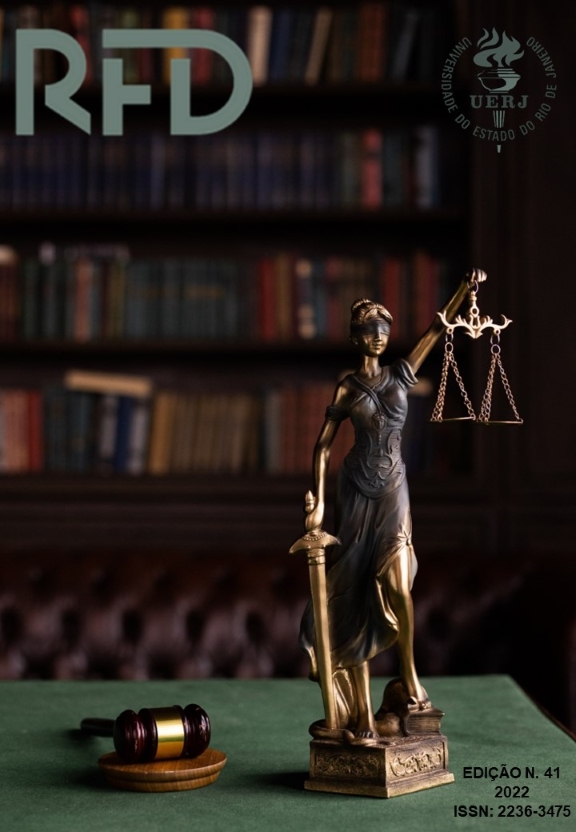POSSIBILIDADES DE UMA HISTÓRIA PRAGMÁTICA DO POLÍTICO / POSSIBILITIES OF A PRAGMATIC HISTORY OF THE POLITICAL
DOI:
https://doi.org/10.12957/rfd.2022.71593Resumo
Resumo: Este ensaio consiste em uma tentativa inicial de propor um método que vem lentamente ganhando forma em nossas investigações individuais e colaborativas acerca da história da democracia nos Estados Unidos e na França. Nossa abordagem como um todo se baseia em diversas influências metodológicas, mas, neste ensaio em particular, destacamos apenas dois dos precedentes mais influentes do nosso trabalho: primeiro, a abordagem pragmático-hermenêutica explicitamente delineada em “Thinking Historically: A Manifesto of Pragmatic Hermeneutics”, de James T. Kloppenberg; segundo, os ensaios metodológicos de Pierre Rosanvallon sobre uma história conceitual do político, apresentados em sua palestra inaugural no College de France.[1] A primeira seção deste artigo relata as primeiras pesquisas voltadas para uma concepção mais filosófica da história americana conforme demonstram as investigações de James Kloppenberg acerca de uma hermenêutica mais pragmática. A segunda parte traça o caminho um tanto diverso de Pierre Rosanvallon em sua busca por uma orientação histórica mais pragmática a partir de seu lugar particular em uma tradição histórica francesa, com um pedigree filosófico (e simbólico) já bem desenvolvido. Concluímos com algumas breves reflexões sobre como os rudimentos do método histórico pragmático podem ser implementados e desenvolvidos no futuro.[2]
[1] James T. Kloppenberg, “Thinking Historically: A Manifesto of Pragmatic Hermeneutics”, Modern Intellectual History 9 (2012): 201–216; Pierre Rosanvallon, “Inaugural Lecture, College de France”, in Democracy Past and Future, ed. Samuel Moyn (New York: Columbia University Press, 2006), 31–58.
[2] Entre outras influências, esse método também foi influenciado pelo método genealógico de Foucault, bem como pela “virada pragmática” nas ciências sociais francesas, sobretudo por sua influência em certos membros dos Annales, conforme apresentado por Bernard Lepetit em Les formes de l’expérience: Une autre histoire sociale (Paris: Albin Michel, 1995). Esperamos elaborar esses outros aspectos em futuros estudos.
Abstract: This essay is an initial attempt to posit a method which has slowly taken shape through our individual and collaborative investigations into the history of democracy in the United States and France. Our overall approach builds on a number of diverse methodological influences, but in this particular essay we highlight just two of the most influential precedents for our work: first, the pragmatic-hermeneutical approach most explicitly outlined by James T. Kloppenberg in his “Thinking Historically: A Manifesto of Pragmatic Hermeneutics” and second, Pierre Rosanvallon’s methodological essays on the theme of “Une histoire conceptuelle du politique,” which he launched with his inaugural lecture at the College de France.[1] Part one of this article recounts the original search for a more philosophical conception of American history as illustrated in James Kloppenberg’s pursuit of a more pragmatic hermeneutics. Part two charts Pierre Rosanvallon’s somewhat different path towards a more pragmatic historical orientation from his distinctive place within a French historical tradition with an already well-developed philosophical (as well as symbolic) pedigree. We conclude with some brief reflections on how the rudiments of this pragmatic historical method might be further deployed and developed in the future.[2]
[1] James T. Kloppenberg, “Thinking Historically: A Manifesto of Pragmatic Hermeneutics,” Modern Intellectual History, 9 (2012): 201-216; Pierre Rosanvallon, “Inaugural Lecture, College de France,” in Samuel Moyn, ed., Democracy Past and Future (New York: Columbia University Press, 2006): 31-58.
[2] Among other influences, this method has also been influenced by Foucault’s genealogical method as well as the “pragmatic turn” in French social science and specifically its influence on certain members of the Annales as presented by Bernard Lepetit in Les formes de l’expérience: Une autre histoire sociale (Paris: Albin Michel, 1995). We hope to elaborate these other aspects in future studies.
Downloads
Publicado
Como Citar
Edição
Seção
Licença
Direitos Autorais
oArtigos publicados na Revista da Faculdade de Direito da UERJ (RFD/UERJ)
Os Direitos autorais dos artigos publicados pertencem à Revista da Faculdade de Direito da UERJ (RFD/UERJ). É permitida a reprodução total ou parcial dos artigos desde que citada a fonte.
oReprodução parcial de outras publicações
Artigos submetidos que contiverem partes de texto extraídas de outras publicações deverão obedecer aos limites especificados para garantir originalidade do trabalho submetido. Plágio em todas as suas formas constitui comportamento antiético e é inaceitável.
Recomenda-se evitar a reprodução de tabelas e ilustrações, extraídas de outras publicações. O artigo que contiver reprodução de uma ou mais tabelas e/ou ilustrações de outras publicações só será encaminhado para análise se vier acompanhado de permissão escrita do detentor do direito autoral do trabalho original para a reprodução especificada na Revista da Faculdade de Direito da UERJ (RFD/UERJ). A permissão deve ser endereçada ao autor do trabalho submetido. Em nenhuma circunstância a Revista da Faculdade de Direito da UERJ (RFD/UERJ) e os autores dos trabalhos publicados nesta revista repassarão direitos assim obtidos.
·Os trabalhos não aceitos para a publicação serão devolvidos aos autores, se solicitado.
A Revista da Faculdade de Direito está licenciada com uma Licença Creative Commons Atribuição 4.0 Internacional.
Este trabalho está licenciado sob uma Licença Creative Commons 4.0, Atribuição-Sem Derivações.
Esta licença permite copiar e redistribuir o material em qualquer suporte ou format para qualquer fim, mesmo que comercial, desde de que citada a autoria original.











